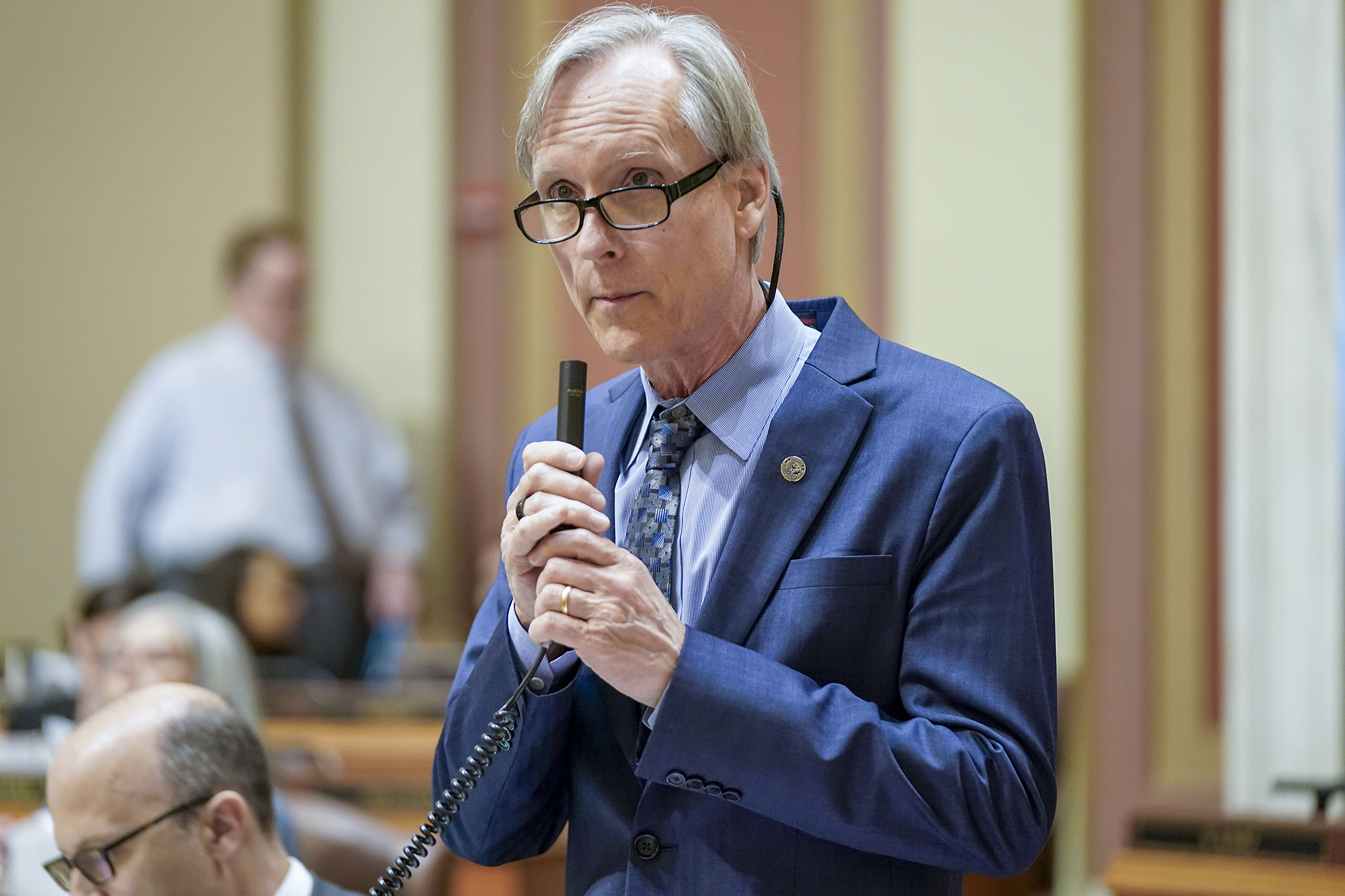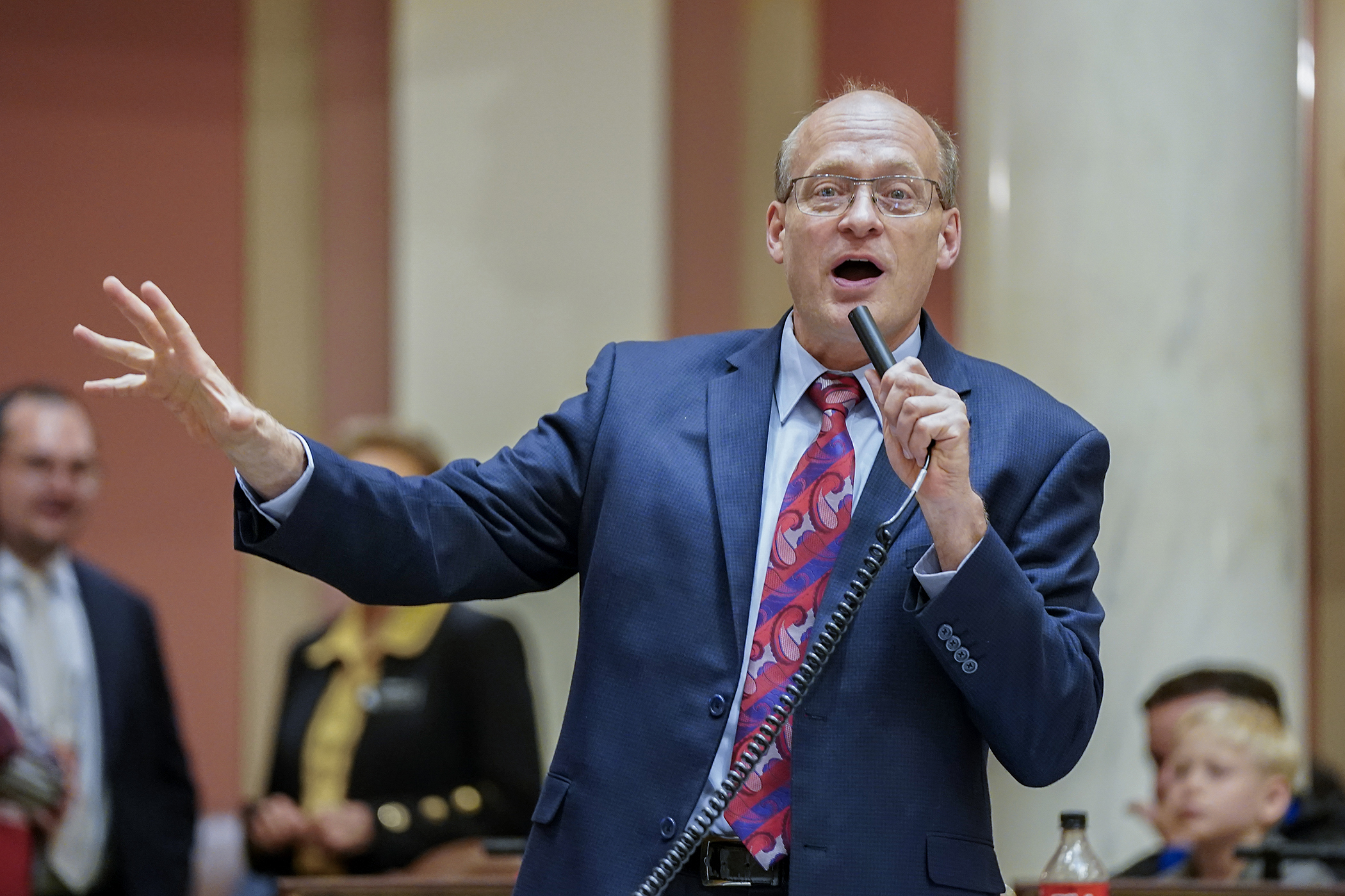With time running out, omnibus budget for health, children and families clears House

An interesting bill with an interesting timeline is the description Rep. Danny Nadeau (R-Rogers) used for the omnibus health and children and families bill.
Bypassing one committee of jurisdiction, hitting the House Floor in the final week and funding a new government department, the bill would appropriate more than $3 billion in the 2026-27 biennium for payments to hospitals, public health initiatives, child care providers and other programs.
Sponsored by Rep. Robert Bierman (DFL-Apple Valley), the House passed HF2435, which, as amended, would provide funding for the Department of Health, Department of Human Services, and Department of Children, Youth, and Families. Following Monday's 95-38 vote, the bill next goes to the Senate.
Health budget
Bierman said the bill would deliver better access and meet some of the state’s most pressing needs. He noted several provisions, including ones that would extend audio telehealth programs, offer dispensing fees to some pharmacies, help graduates of foreign medical schools practice in the state and provide additional resources to battle opioid overdoses.
Rep. Jeff Backer (R-Browns Valley), who co-chairs the House Health Finance and Policy Committee with Bierman, said the proposal focuses on programs that work while avoiding tax and fee increases.
While supporting the bill, Nadeau nonetheless noted what he found lacking: no funding for MinnesotaCare, no plan for what may be coming with regard to potential Medicaid cuts from the federal government, and no recognition of a response to a health care system that has an significant percentage of the population enrolled in a public program.
What’s in the health bill
The proposed package meets the House budget target of reducing General Fund spending by $50 million in the upcoming biennium.
 Rep. Jeff Backer, co-chair of the House Health Finance and Policy Committee, speaks to provisions in the omnibus health and children and families finance bill May 12 on the House Floor. (Photo by Michele Jokinen)
Rep. Jeff Backer, co-chair of the House Health Finance and Policy Committee, speaks to provisions in the omnibus health and children and families finance bill May 12 on the House Floor. (Photo by Michele Jokinen)Expected savings would come from uniform administration of non-emergency medical transport; increasing the share of medical assistance coming from the Health Care Access Fund; shrinking some grant programs; and repealing the Commerce Department’s authority to seek federal approval for a public option and canceling an appropriation contingent on the approval.
The bill would provide additional funding for some ambulance services, pharmacies and the Health Department’s operating budget. It would also provide for federal authority to establish a directed payment program, which could mean additional money for hospitals.
Other provisions would:
- extend the state’s Trauma Advisory Council to 2035;
- require a warning label on social media sites;
- push back the sunset on Drug Formulary Committee;
- provide medical assistance coverage on some traditional health care practices;
- provide regulations for so-called green burials in public cemeteries; and
- delay implementation of dental administrator for medical assistance and MinnesotaCare.
[MORE: Download the health finance spreadsheet, governor’s budget recommendations]
Health care amendments
Bierman successfully offered an amendment to remove the establishment of a certified midwife license provision, in part, so it could be heard in additional committees.
Rep. Kristin Robbins (R-Maple Grove) successfully offered an amendment, also included in the health policy bill, that would require informed consent for sensitive exams.
Among amendments not adopted is one by Rep. Kristi Pursell (DFL-Northfield) to increase funding for sexual and reproductive health service grants by $4 million and one offered by Rep. Natalie Zeleznikar (R-Fredenberg Township) to restore grants to pregnancy centers and maternity homes, which were eliminated in the 2023 budget. Both failed on party-line votes.
Children and Families
The children and families budget portion of the bill would make a large investment to upgrade a computer system, address food insecurity in the state, increase funding for early childhood education scholarships and require security cameras in child care centers.
“This bill really does a lot of good bipartisan work in order to make sure that we are making investments in the future of Minnesota, which of course, is in our littlest learners and their families,” said Rep. Carlie Kotyza-Witthuhn (DFL-Eden Prairie), co-chair of the House Children and Families Finance and Policy Committee. “Making sure that we were not going backwards on our commitment to those families, to those children, we are able to continue making investments, supporting child care providers, investing in changes, preventing fraud, and making sure that we continue to strengthen the systems that exist currently in Minnesota.”
The investment in the computer systems would be a one-time $40 million appropriation in fiscal year 2026 to upgrade and modernize the Social Service Information System used for child welfare cases.
That investment is part of the $2.14 billion children and families budget for fiscal years 2026-27, which meets the $25 million increase from the February base forecast, set by House leadership.
[MORE: Download children and families spreadsheet]
“I've heard we need to fund SSIS for like 15, 20 years. That's a lie, more like 10 to 15, but still, I can't believe it hasn’t been done, and I am very proud that we are able to do it in this bill,” said Rep. Nolan West (R-Blaine), co-chair of the committee.
The bill would provide $500,000 in fiscal year 2026 for grants to help with the costs of video security cameras that would be required in licensed child care centers in public and shared areas of its facility if the center is required to post a maltreatment investigation memorandum.
In addition, the bill would increase the Department of Children, Youth and Families operating budget by nearly $5.83 million over the biennium and make a nearly $6 million appropriation for early childhood education scholarships.
[MORE: $2.14 billion funding bill aims to boost child welfare, early childhood programs]
The bill would provide emergency food assistance with $2.5 million for food shelf programs, $1 million for food banks with an annual operating budget of less than $100 million in fiscal year 2025 and $500,000 for the American Indian food sovereignty program. In fiscal year 2026, the bill has $500,000 for the American Indian food sovereignty program, $451,000 for the food shelf program, $500,000 for food banks, and $451,000 for prepared meals.
“We are definitely going to stem the bleeding of our child care providers, provide some support, and keep our public assistance systems running and working into the future,” West said. “It's a pretty decent bill.”
Amendments
An amendment that would allow the local welfare agency to investigate child maltreatment when the maltreatment occurred in another state if the victim was a Minnesota resident was adopted, but amendments to delay the implementation of the Minnesota African American Family Preservation and Child Welfare Disproportionality Act and reinstate the Great Start Compensation Program both failed.
— Session Daily writer Todd Abeln contributed to this story
Related Articles
Search Session Daily
Advanced Search OptionsPriority Dailies
Legislative leaders set 2026 committee deadlines
By Lisa Kaczke Legislative leaders on Tuesday officially set the timeline for getting bills through the committee process during the upcoming 2026 session.
Here are the three deadlines for...
Legislative leaders on Tuesday officially set the timeline for getting bills through the committee process during the upcoming 2026 session.
Here are the three deadlines for...